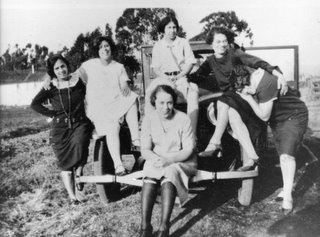 Displaced New Orleans Creoles -- newly "placed" ...
Displaced New Orleans Creoles -- newly "placed" ...Finding myself wondering -- each time I see a newscast that includes an update on those made homeless by Katrina -- whether they know that life will go on. That, in time, the world will stabilize and some sense of order will be restored. It was so with those of us made homeless in the great hurricane in New Orleans in 1927.
Though only a child of six with little sense of the trauma being experienced by my parents, I am dimly aware still of throbbing, palpable, change that occurred as our new lives began in a strange place called Oakland with little to remind us of "home."
However, New Orleans was gradually replaced by a place where lagniappe and soft-shelled crabs and oyster loaves and coffee with the distinctive aroma of chicory, and french bread as light as air, and lost bread, and cream cheese floating in rich sweet cream in little cartons, and early morning improvised songs of street vendors hawking watermelons, persimmons, and blackberries from pushcarts ... all too soon forgotten by the children. The gumbo and jambalaya and head cheese came with us with little brown-paper packages of filé following in suitcases of travelers who made it back home over time; mostly porters who "ran on the road". There was little else for African Americans (Creole or no) to do in the West. We provided the service workers -- or no jobs at all. It was, after all, the preliminary to the Great Depression years. It was the mid-to-late Twenties.
It was a big night when Papa George came home from the Oakland Athletic Club where he waited tables for (white) VIPs at big parties. We little ones would be allowed to get out of bed -- late though it might be -- to share in the paper party hats, tiny sandwiches, balloons, and sweets that would arrive with him wrapped carefully in dishtowels and hidden under his overcoat. It doesn't take much to make a celebrant of a child. New Orleans had none of this.
Our parents met at novenas at parish churches, or, in mother's social club, "The 500," Mom's social club named for the whist-like card game they played frequently in a round-robin of hostessing.
I look at those years now in retrospect as if I, too, had experienced them as an adult. What rises for me are the kaleidoscopic events that brought such profound social change to my own life, and to the lives of those around me in subsequent years.
My parents died years ago, taking with them all of the pain of the resettlement. I cannot speak to that. But it feels ironic to me that I'm now working with the National Park Service in the process of enshrining a period in history (World War II) that was also marked by racial segregation and that, despite all of the intervening years, Katrina's shocking exposure of the wounds; the scars, the degradation of racism that has revived the fears and the shame of sins long thought forgiven and atoned for.
It's the scabbing over then re-infecting of the awful period of the Civil War and Reconstruction -- never quite resolved ... only dormant for periods ... ever to be revived then matastacize; to go into temporary remission in an endless progression toward ever-freshening rejection until we stop still and take the time to speak the terrible words of hate aloud; do the incantations; burn the incense, bay at the full moon; meditate on our sins; make appropriate apologies; pray to whatever God deemed powerful enough to save us; deal with reparations; then to do whatever it takes to fully acknowledge the awfulness we've lived through in our always tragic and tainted shared unaddressed national history of shame!
It is quite impossible to not see a re-living of the separation of families now spread far and wide as creating yet another diaspora for black peoples. It takes very little imagination to not see a replay of my own ancestors being sold off the slave blocks -- husbands, wives, and children sold to landowners widely separated -- never to be reunited. Katrina aided by an uncaring bureaucracy has mirrored the nightmare, and each day of uncertainty for those still scattered throughout the states makes a mockery of our nation's quest for replicating this "Democracy" through the known world.
Maybe that's why a discovery this morning of mother's "500 Club" snapshot meant so much. It is a testimony to the determination of women to rebuild broken lives; to survive in the face of what appears to be irreplaceable losses.
Despite all, we have survived, and against great odds at times. My own life attests to that truth. Today's families will find ways to do likewise. I truly believe that. But one would have hoped that more progress would have been made after so many years of struggle. There is comfort in the possibility that the percentage of "the Enlightened" has grown exponentially, and that one day soon we'll hit a tipping point and be saved from ourselves. There was surely evidence in the numbers of people who responded with shock and horror at the callousness of the administration's first responders in the wake of the great tragedy of Katrina. We could see it in the faces of those who entered the inundated city as jaded journalists but who've since returned to deliver the updates as concerned citizens demanding change.
Maybe this time ... .
Photo: Back row; Albertine ?, Marie Gaudette Allen, Ruth Smith, Mabel Lashbrook Allen, Annabelle LeBeouf Therence; in front, Lucille Towns. Some of the members of the "500" social club.
No comments:
Post a Comment